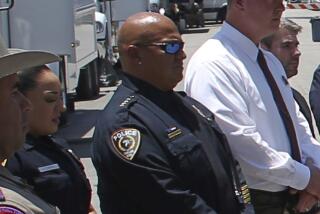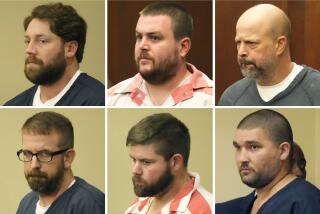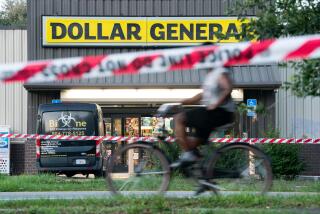Policeman Sentenced to Die for Massacre Order : South Africa: White captain directed the 1988 slaying of 11 blacks in a house, then attempted a cover-up.
- Share via
JOHANNESBURG, South Africa — A white South African police captain was sentenced Thursday to hang for ordering the 1988 massacre of 11 black men, women and children at a home funeral vigil--and then attempting to cover it up with help from his police superiors.
The 11 death sentences handed down against Capt. Brian Mitchell, 34, ended a historic trial that uncovered the clearest evidence yet that government security forces were directly responsible for at least some of the bloody factional fighting between rival black groups in Natal Province.
Judge Andrew Wilson, of the district Supreme Court in Pietermaritzburg, concluded that Mitchell had masterminded the pre-dawn massacre in the black community of Trust Feed in Natal on Dec. 3, 1988, selected the target, sent four black police officers to kill the house’s occupants and then ordered them to burn the house to destroy evidence.
Mitchell admitted that the attack was part of a larger effort, supported by the security forces, to help Mangosuthu Gatsha Buthelezi’s Inkatha movement wrest control of townships from the United Democratic Front (UDF). The UDF was an anti-apartheid organization with strong links to Inkatha’s nemesis, the African National Congress.
The judge also convicted four black policemen under Mitchell’s command on 11 counts of murder, and each received a 15-year prison sentence Thursday. Two white officers were acquitted. There are no jury trials in South Africa.
Judge Wilson, who had wide discretion in sentencing, said the crime demanded “the most severe form of punishment” for Mitchell. Retribution, he added, “played an extremely important role in sentencing.”
The police captain had “abused his position by carefully planning an operation aimed at killing innocent people whose sole fault was supporting a legitimate organization that he was opposed to,” the judge said.
The judge added that Mitchell had been “completely coldblooded” after the killings, making no attempt to determine how many people were killed or injured and instead going back to his office and preparing a cover-up.
The four black policemen were given less severe sentences because they acted under orders, Wilson said. But, he added, the four should have known that the orders were illegal and that they “deliberately shot dead people knowing that many of them were women and children.”
Judge Wilson, who is white, frequently criticized the police during the six-month trial in Pietermaritzburg, the focal point for black factional fighting that has claimed more than 4,000 lives in the past six years.
Wilson said it is clear that the attack had been planned by Mitchell along with the head of the police riot unit in Pietermaritzburg, who has since died, and the leader of the Inkatha movement in Pietermaritzburg. Other senior white police officers, including a general, a colonel and a captain, may have been involved in the cover-up, the judge said.
On Thursday, the judge repeated his call for a public inquiry into the handling of the original investigation into the massacre. The case was reopened after two years by Capt. Frank Dutton, who came upon evidence of a police role in the massacre during his investigation of crimes allegedly committed by a member of the legislative assembly in Buthelezi’s self-governing homeland.
After the verdicts, Police Commissioner Johan van der Merwe announced that he was ordering an internal investigation. But Van der Merwe tried to distance his force from Mitchell’s actions, saying it was “regrettable that individual members (of the force) who harbored misguided beliefs chose to act outside the law.”
But the ANC and other anti-apartheid organizations joined the judge’s call for an independent public inquiry, saying that an internal police investigation would be “inadequate, given they were part of the problem.”
The ANC also said the verdict had, for the first time, identified the “third force” that it contends has been behind much of the black faction fighting in the country.
Judge Wilson granted Mitchell permission to appeal. Although the death penalty remains on the books in South Africa, hangings have been suspended pending the outcome of constitutional negotiations among the government, the ANC and 19 other political parties.
The ANC opposes the death penalty. And in a statement Thursday, the ANC said it “would have preferred a sentence of life imprisonment” for Mitchell.
The township of Trust Feed was an oasis in troubled Natal when Brian Mitchell arrived there in early 1988 to become commander of the area’s police station. At the time, Mitchell was a key member of the Joint Management System, a secretive central government network responsible for national security. The Joint Management System has since been disbanded.
At the time, Trust Feed was controlled by a United Democratic Front-aligned residents’ association, the Trust Feed Crisis Committee. Many police officers hated and feared the UDF, which they believed was trying to make the country ungovernable. But they liked Inkatha, which shared their hatred of the UDF.
So, Mitchell testified, he set out to “jack up” the local Inkatha leader “and get him to be more forceful” with the UDF’s Crisis Committee members. Then police declared Trust Feed an unrest area and barred journalists from entering.
A day before the massacre, the police arrested a dozen UDF leaders and searched the homes of many UDF supporters and confiscated weapons.
“The aim was to make it easy for Inkatha to wipe out the UDF once and for all?” Judge Wilson asked Mitchell during the trial.
“Yes,” Mitchell replied.
That night, the homes of most of the detained UDF leaders were burned. A shop owned by a UDF leader also was burned. Above that smoldering store, though, a group of people had gathered for an all-night funeral vigil for a man who had died of natural causes.
An Inkatha-supporting family lived in that home. But Mitchell mistakenly believed that it belonged to the store owner and, at about 3 a.m., he brought the four black policemen to Trust Feed and ordered them to kill the “terrorists” inside that home.
Three men, six women and two boys, ages 9 and 4, were shot at point-blank range. The children were found, curled up in fetal positions, lying next to each other. Two women, buried beneath the dead, survived.
The next day, when it became clear that the victims had been Inkatha supporters, the police blamed UDF terrorists for the killings. Within weeks, all UDF supporters had fled Trust Feed.
More to Read
Sign up for Essential California
The most important California stories and recommendations in your inbox every morning.
You may occasionally receive promotional content from the Los Angeles Times.














